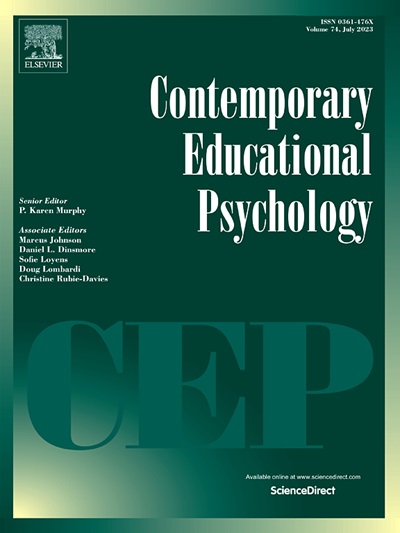Teacher feedback and students’ self-concept, intrinsic value, and achievement in mathematics: Juxtaposing between- and within-person perspectives on long-term reciprocal relationships
IF 3.8
1区 心理学
Q1 PSYCHOLOGY, EDUCATIONAL
引用次数: 0
Abstract
For decades, the feedback teachers give to students has been discussed as one of the most powerful predictors of students’ motivation and achievement. Previous studies have suggested that the type of feedback and its degree of elaboration, immediacy, and relatability are central to its effectiveness. However, these factors explain only some of the variability in the effects of feedback on students’ motivation and achievement. Thus, more recent work has proposed a shift toward models that more strongly emphasize the role of the student in the effectiveness of feedback. In this study, we answer the call for a stronger focus on the student when investigating the long-term interplay between students’ perceptions of teacher feedback and students’ motivation and achievement by using rich data from 2,121 German lower secondary school students who were repeatedly assessed in Grades 5 to 7. More specifically, we used full-forward cross-lagged panel models (FF-CLPMs) and random intercept cross-lagged panel models (RI-CLPMs) to investigate reciprocal relationships between students’ perceptions of different types of teacher feedback (i.e., at the self-level, the process level, and the self-regulation level) and students’ self-concept, intrinsic value, and achievement in mathematics. By considering these variables simultaneously, we found evidence of associations between prior self-concept, intrinsic value, achievement, and perceptions of different forms of subsequent teacher feedback. Furthermore, we found that prior perceptions of feedback were positively related to subsequent self-concept. Our results underscore the need to more thoroughly investigate how feedback is longitudinally and reciprocally related to students’ motivation and achievement.
教师反馈与学生的自我概念、内在价值和数学成就:长期互惠关系的个人视角与个人视角的并列
几十年来,教师给予学生的反馈一直被认为是学生动机和成就的最有力预测因素之一。先前的研究表明,反馈的类型及其详细程度、即时性和相关性是其有效性的核心。然而,这些因素只能解释反馈对学生动机和成就影响的部分变化。因此,最近的研究提出了一种模式的转变,即更强调学生在反馈有效性中的作用。在这项研究中,我们回应了在调查学生对教师反馈的看法与学生动机和成就之间的长期相互作用时更加关注学生的呼吁,使用了来自2,121名德国初中学生的丰富数据,这些学生在五年级到七年级被反复评估。更具体地说,我们使用全前向交叉滞后面板模型(ff - clpm)和随机截点交叉滞后面板模型(ri - clpm)来研究学生对不同类型教师反馈(即自我水平、过程水平和自我调节水平)的感知与学生的自我概念、内在价值和数学成绩之间的相互关系。通过同时考虑这些变量,我们发现了先前的自我概念、内在价值、成就和对不同形式的后续教师反馈的感知之间存在关联的证据。此外,我们发现先前的反馈知觉与随后的自我概念呈正相关。我们的研究结果强调,有必要更彻底地调查反馈与学生的动机和成就之间的纵向和相互关系。
本文章由计算机程序翻译,如有差异,请以英文原文为准。
求助全文
约1分钟内获得全文
求助全文
来源期刊

Contemporary Educational Psychology
PSYCHOLOGY, EDUCATIONAL-
CiteScore
16.50
自引率
3.90%
发文量
74
期刊介绍:
Contemporary Educational Psychology is a scholarly journal that publishes empirical research from various parts of the world. The research aims to substantially advance, extend, or re-envision the ongoing discourse in educational psychology research and practice. To be considered for publication, manuscripts must be well-grounded in a comprehensive theoretical and empirical framework. This framework should raise critical and timely questions that educational psychology currently faces. Additionally, the questions asked should be closely related to the chosen methodological approach, and the authors should provide actionable implications for education research and practice. The journal seeks to publish manuscripts that offer cutting-edge theoretical and methodological perspectives on critical and timely education questions.
The journal is abstracted and indexed in various databases, including Contents Pages in Education, Australian Educational Index, Current Contents, EBSCOhost, Education Index, ERA, PsycINFO, Sociology of Education Abstracts, PubMed/Medline, BIOSIS Previews, and others.
 求助内容:
求助内容: 应助结果提醒方式:
应助结果提醒方式:


